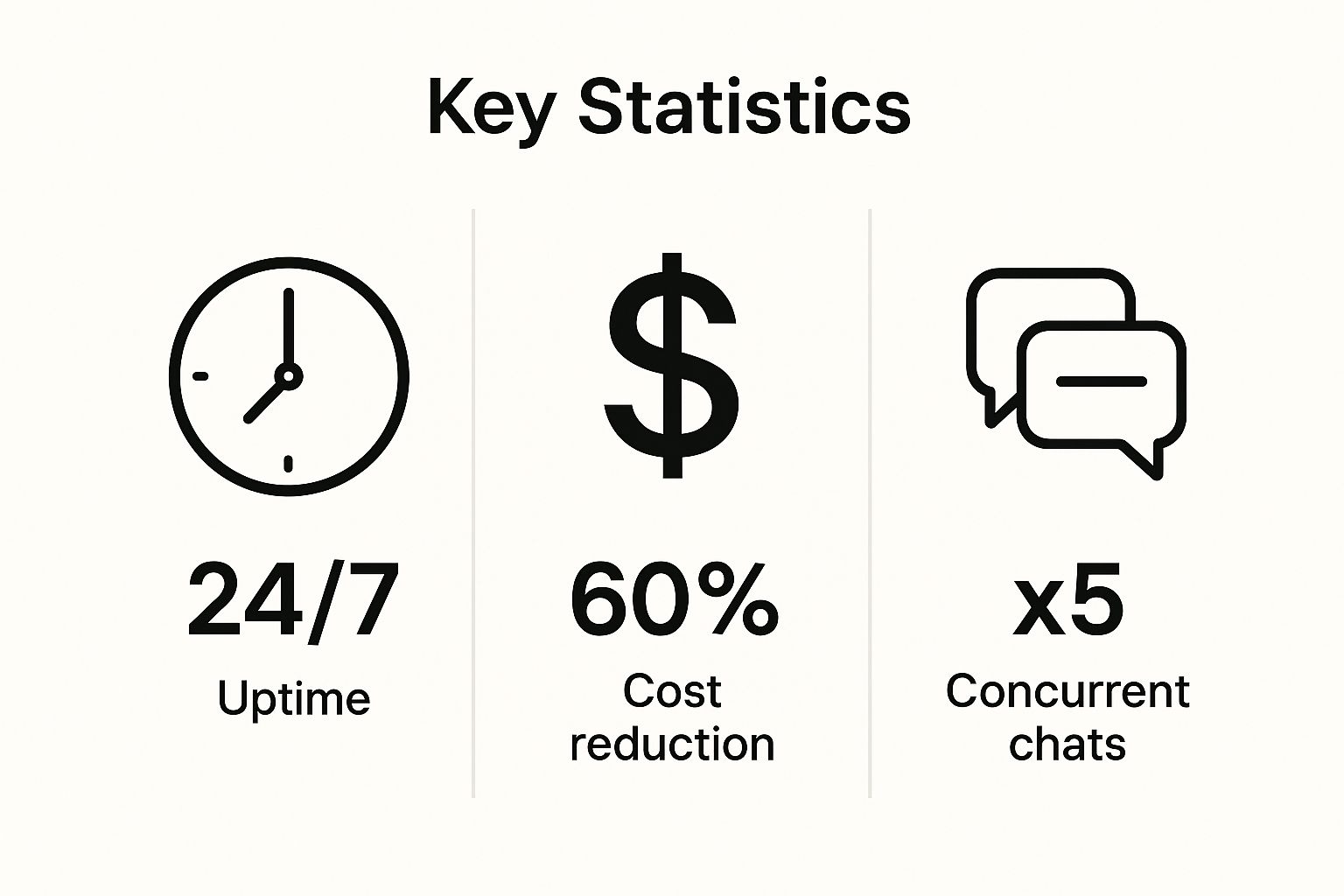Henri's Take on AI for Small Business
Ready to supercharge your small business? This list reveals seven practical ways AI can transform everything from customer service to sales. Whether you're a solopreneur, aspiring creator, or career pivoter, discover how AI for small business can automate tedious tasks, sharpen your marketing, and give you a real competitive edge. Let's unlock your business potential with the power of AI.
1. AI-Powered Customer Service and Chatbots
Imagine a tireless employee, available 24/7, capable of handling multiple customer inquiries simultaneously, and never losing their cool. That's the power of AI-powered customer service and chatbots for your small business. In today's fast-paced digital world, providing exceptional customer service is paramount to success. AI chatbots offer a revolutionary way to enhance customer experience, streamline operations, and unlock growth potential, all while significantly reducing costs. These intelligent systems leverage natural language processing (NLP) to understand and respond to customer queries, mimicking human conversation with remarkable accuracy. They can handle everything from answering basic FAQs and providing product recommendations to processing orders and scheduling appointments. This frees up your valuable time and resources, allowing you to focus on strategic initiatives that drive your business forward.
AI-powered customer service isn't just about automating responses; it's about creating personalized, engaging experiences that build lasting customer relationships. By integrating with your existing CRM system, chatbots can access customer data to tailor their interactions, providing relevant information and offers. Whether deployed on your website, social media platforms, or messaging apps, these versatile tools ensure your customers receive prompt and consistent support across all channels. Features like sentiment analysis further enhance the experience, allowing the chatbot to detect customer mood and adjust its responses accordingly, leading to greater customer satisfaction. For example, Sephora’s chatbot provides personalized beauty consultations and product recommendations, while H&M uses a chatbot on Kik to help customers browse and purchase clothing. Even Pizza Hut has embraced this technology, allowing customers to order through a Facebook Messenger chatbot.
While the benefits are substantial, understanding the limitations of AI chatbots is crucial. They excel at handling routine inquiries but may struggle with complex or nuanced requests. Initial setup and training can be time-consuming, and some customers may still prefer human interaction. Ongoing maintenance and updates are also necessary to ensure optimal performance. Therefore, it’s vital to provide a seamless escalation path to human agents for more complex issues. Bank of America’s virtual assistant, Erica, demonstrates this well by handling basic banking queries and transactions while seamlessly transferring complex issues to human representatives.
Thinking of incorporating AI chatbots into your business? Here are a few actionable tips to ensure a successful implementation:
- Start small: Begin with simple, frequently asked questions before expanding the chatbot’s functionality.
- Human handover: Always provide an easy escalation path to human agents for complex issues.
- Continuous improvement: Regularly analyze conversation logs to identify areas for improvement.
- Test thoroughly: Before full deployment, rigorously test the chatbot to ensure it functions as expected.
- Manage expectations: Clearly communicate the chatbot's capabilities to customers.
The infographic below visualizes key data points highlighting the potential impact of AI-powered customer service.

As the infographic demonstrates, AI chatbots provide 24/7 availability, can reduce customer service costs by up to 60%, and can handle multiple (up to 5) concurrent chats, highlighting their efficiency and cost-effectiveness.
Learn more about AI-Powered Customer Service and Chatbots
Whether you’re a solopreneur seeking differentiation, a content creator refining your positioning, a career pivoter building a new path, a coach/consultant attracting the right clients, or a purpose-driven professional seeking more meaningful work, AI-powered customer service can revolutionize your business. By automating routine tasks, providing instant support, and freeing up your time, these intelligent tools empower you to focus on what truly matters: growing your business and serving your customers better. Platforms like Facebook Messenger Platform, IBM Watson Assistant, Intercom, Drift, and Zendesk have popularized and simplified the implementation of AI chatbots, making this powerful technology accessible to businesses of all sizes. Embrace the future of customer service and unlock the transformative potential of AI for your small business.
2. Automated Email Marketing and Personalization
In today's digital age, connecting with your audience on a personal level is more critical than ever for small businesses. Generic mass emails often get lost in the noise, but what if you could speak directly to each customer's individual needs and desires? That's the power of AI-driven email marketing and personalization, a game-changer for solopreneurs, aspiring creators, career pivoters, coaches, consultants, and purpose-driven professionals alike. This powerful tool leverages artificial intelligence to transform your email marketing from a scatter-shot approach into a laser-focused strategy, helping you build stronger relationships, drive conversions, and ultimately, grow your business. This is why it absolutely deserves a spot on the list of essential AI tools for small businesses.
AI-powered email marketing systems analyze customer behavior, preferences, and engagement patterns to craft highly personalized email campaigns. Imagine having a virtual assistant that meticulously studies each customer interaction, from website browsing to past purchases, and then uses that data to tailor the perfect email message. These systems optimize everything from send times and subject lines to content and frequency, maximizing open rates, click-through rates, and, most importantly, conversions.
Think about how Netflix recommends movies and shows you might enjoy based on your viewing history. That’s the principle behind AI-driven email personalization. It's about understanding your audience and delivering relevant content at the right time. Just like Netflix, Amazon leverages this technology to send product recommendation emails tailored to your browsing history. Spotify curates personalized playlists and sends music discovery emails based on your listening habits. And Airbnb suggests travel destinations based on your location and past bookings. These are prime examples of how large companies successfully implement AI-powered email marketing. As a small business owner, you can harness the same technology to create equally impactful campaigns.
Features that Empower Your Email Marketing:
- Behavioral trigger-based email sequences: Automatically send targeted emails based on specific customer actions, like abandoning a cart or signing up for a newsletter.
- Dynamic content personalization: Tailor email content to individual recipients based on their demographics, interests, and purchase history.
- Predictive send time optimization: AI determines the optimal time to send emails to each subscriber, maximizing open and click-through rates.
- A/B testing automation: Automatically test different email variations to identify the most effective subject lines, content, and call-to-actions.
- Customer segmentation based on AI analysis: Group customers into distinct segments based on shared characteristics, enabling highly targeted campaigns.
- Churn prediction and retention campaigns: Identify at-risk customers and proactively engage them with personalized offers and incentives to prevent churn.
The Advantages of Embracing AI in Email Marketing:
- Higher engagement rates through personalization: Tailored content resonates more deeply with recipients, leading to increased open and click-through rates.
- Automated workflow saves significant time: AI handles the heavy lifting, freeing up your time to focus on other critical aspects of your business.
- Better ROI compared to generic mass emails: Personalized campaigns drive higher conversions, resulting in a better return on your marketing investment.
- Improved customer retention and lifetime value: By nurturing customer relationships with personalized communication, you can increase customer loyalty and lifetime value.
- Data-driven insights for campaign optimization: AI provides valuable data and analytics to continuously refine and improve your email marketing strategy.
Navigating the Potential Challenges:
- Requires substantial customer data to be effective: AI algorithms require sufficient data to accurately analyze customer behavior and preferences.
- Risk of over-automation leading to impersonal communication: While automation is key, it’s crucial to maintain a human touch and avoid overly robotic messaging.
- Privacy concerns and compliance requirements: Ensure your email marketing practices comply with data privacy regulations like GDPR.
- Initial learning period may show inconsistent results: It may take time for the AI to learn and optimize your campaigns for optimal performance.
Tips for Success with AI-Powered Email Marketing:
- Collect and clean customer data before implementing AI personalization.
- Start with simple personalization like name and location.
- Monitor deliverability rates to avoid spam filters.
- Maintain a balance between automation and human touch.
- Regularly audit and update customer segments.
Learn more about Automated Email Marketing and Personalization
By understanding your audience, you can leverage AI to craft compelling email campaigns that resonate with individual needs and desires. Remember, AI is a tool that empowers you to connect with your audience on a deeper level, build stronger relationships, and ultimately, achieve your business goals. Whether you're a solopreneur launching a new service, a creator building a personal brand, or a consultant seeking to attract ideal clients, AI-powered email marketing can be the key to unlocking your full potential. This sophisticated yet accessible technology empowers you to communicate effectively, nurture leads, and drive conversions, all while saving you valuable time and resources. Embrace the power of AI and transform your email marketing from a routine task into a powerful engine for growth.
3. AI-Enhanced Social Media Management
For small businesses, social media is a critical tool for connecting with customers, building brand awareness, and driving sales. But managing multiple social media accounts can be incredibly time-consuming, often feeling like a full-time job in itself. This is where the magic of AI-enhanced social media management comes in. Imagine having a virtual assistant tirelessly working behind the scenes, optimizing your social media strategy for maximum impact. This powerful technology uses artificial intelligence to automate tasks, analyze data, and offer insights that can significantly elevate your social media game. No longer do you need to be chained to your phone, constantly posting and engaging. Instead, you can reclaim your time and focus on what you do best – running and growing your business.

AI-powered social media management tools offer a comprehensive suite of features designed to streamline your efforts. These tools automate the scheduling and posting of content, ensuring a consistent social media presence without demanding your constant attention. They delve deep into engagement patterns, analyzing what resonates with your audience and providing recommendations for optimization. Furthermore, they keep their finger on the pulse of the social media landscape, identifying trending topics and relevant hashtags to maximize your reach and visibility. Think of it as having a dedicated research team constantly exploring the latest trends and tailoring them to your specific niche.
But AI-enhanced social media management goes beyond mere automation. It empowers you with data-driven insights to refine your content strategy. By analyzing performance data, these tools can predict which content is likely to resonate most with your target audience, enabling you to create more effective and engaging posts. They also monitor brand mentions and sentiment across multiple platforms, providing real-time feedback on how your brand is perceived. This social listening capability is invaluable for reputation management and allows you to address any negative sentiment promptly. In today's fast-paced digital world, staying informed about your brand's online presence is crucial for building a strong and positive reputation.
Consider the success stories of established brands like Wendy's and Nike. Wendy's leverages AI to monitor social mentions and respond quickly, fostering real-time engagement with their audience. Nike utilizes AI for personalized social media advertising, targeting specific customer segments with tailored messages. But the power of AI isn't just reserved for large corporations. Small boutiques are using Hootsuite's AI features for optimal posting times, while local restaurants use Buffer's analytics for engagement optimization. This technology is democratizing access to sophisticated social media strategies, leveling the playing field for small businesses and entrepreneurs.
While the benefits are undeniable, it’s important to acknowledge the potential drawbacks. There’s a risk of appearing robotic or inauthentic if relying solely on AI-generated content. These tools can also miss real-time events requiring immediate human intervention, and platform algorithm changes can sometimes affect AI effectiveness. Therefore, human oversight remains essential to ensure brand voice consistency and adapt to unforeseen circumstances.
To effectively implement AI-enhanced social media management, consider these actionable tips: maintain a content calendar with a mix of automated and spontaneous posts to strike a balance between efficiency and authenticity; use AI insights to inform your strategy, but always retain your unique human voice; set up alerts for brand mentions requiring immediate attention; regularly review and adjust AI-generated content recommendations; and test different posting times and content types using AI analytics to continuously optimize your approach.
AI-enhanced social media management deserves its place on this list because it addresses a significant pain point for small businesses: the overwhelming nature of social media marketing. It empowers entrepreneurs, solopreneurs, and aspiring creators to amplify their social media presence efficiently and effectively. Whether you are a career pivoter seeking direction or a purpose-driven professional looking to make a bigger impact, leveraging AI for social media management can free up your time and resources, allowing you to focus on your core business goals. Learn more about AI-Enhanced Social Media Management and discover how this technology can transform your social media strategy.
4. Intelligent Inventory Management and Demand Forecasting
Imagine a world where you always have the right amount of product on hand, never missing a sale due to a stockout, and never tying up precious capital in excess inventory. This isn't a pipe dream; it's the power of AI-driven intelligent inventory management and demand forecasting. For small businesses, especially those with limited resources, this technology can be a game-changer, providing a competitive edge previously only accessible to large corporations. This approach leverages AI systems to analyze your historical sales data, seasonal trends, market conditions, and even external factors like weather patterns to accurately predict future demand. By understanding what your customers are likely to want and when, you can optimize your inventory levels, minimize storage costs, and maximize your profitability. This allows you to focus on what you do best – growing your business and serving your customers.

This technology isn't about replacing your intuition and business acumen; it's about augmenting it. The AI provides data-driven insights, empowering you to make smarter decisions. Whether you're a solopreneur running an online store, a consultant managing physical products, or a creator selling merchandise, intelligent inventory management allows you to streamline your operations and free up time to focus on what truly matters: connecting with your audience and building your brand. Specifically, AI-powered systems offer features like predictive demand forecasting, automated reorder point calculations, seasonal trend analysis, multi-location inventory optimization (if applicable), supplier performance tracking, and even price optimization based on demand patterns.
Think about the frustration of losing a sale because you're out of stock. Or the burden of storing excess inventory, tying up your cash flow. AI-powered inventory management tackles these challenges head-on. By accurately predicting demand, you reduce the risk of stockouts, ensuring you can meet customer needs and maximize sales opportunities. Simultaneously, it minimizes the need to hold excessive stock, freeing up valuable warehouse space and reducing carrying costs. This improved cash flow management can be a lifeline for small businesses, allowing you to reinvest in growth and innovation.
Here are some examples of successful implementation: Zara uses AI for optimizing its fast-fashion inventory, reacting quickly to changing trends. Walmart leverages AI to manage inventory across its vast network of stores. Even small electronics retailers and local pharmacies are benefiting from AI-powered inventory solutions offered by platforms like TradeGecko (now QuickBooks Commerce), Cin7, Brightpearl, Fishbowl, and Zoho Inventory. These examples show that the power of AI is accessible to businesses of all sizes.
To successfully implement AI for inventory management in your small business, consider these actionable tips:
- Start small: Begin by implementing AI for your best-selling products to see the benefits firsthand before expanding to your entire inventory.
- Integrate external data: Connect your AI system to external data sources like weather forecasts and local event calendars to improve prediction accuracy. Imagine a sudden heatwave driving up demand for your iced tea product – your AI can anticipate this and adjust inventory accordingly.
- Set up alerts: Configure automated alerts for unusual demand patterns, giving you the opportunity to react quickly to unexpected market shifts or identify emerging trends.
- Validate predictions: Regularly compare AI predictions against actual sales data to ensure accuracy and fine-tune the system.
- Consider seasonality and promotions: Factor in seasonal fluctuations and the impact of planned promotions when interpreting AI forecasts.
While the benefits are significant, it's crucial to acknowledge the potential downsides. AI systems rely on historical data, meaning they may struggle with predicting demand for new product launches. External market shocks can also disrupt predictions. Furthermore, setting up a multi-location inventory system can be complex initially. However, the long-term advantages of improved efficiency, reduced costs, and enhanced customer satisfaction far outweigh the initial challenges. By implementing AI for intelligent inventory management and demand forecasting, you are not just managing stock; you are investing in the future success of your business. You’re empowering yourself to make data-driven decisions, optimize your resources, and ultimately, achieve your entrepreneurial dreams.
5. AI-Powered Sales Lead Scoring and CRM Automation
As a small business owner, juggling multiple responsibilities is your daily bread. From crafting compelling marketing campaigns to providing stellar customer service, your time is precious. That’s where the magic of AI-powered sales lead scoring and CRM automation comes in. Imagine a system that intelligently sifts through your prospects, identifies the hottest leads, and even nurtures them towards conversion – all while you focus on what you do best. This isn't science fiction; it's a game-changer for small businesses ready to level up.
AI-powered lead scoring and CRM automation seamlessly integrate with your Customer Relationship Management (CRM) system to supercharge your sales process. These systems analyze vast amounts of data – from prospect behavior and demographics to engagement patterns – and assign each lead a score reflecting their likelihood to convert into a paying customer. Think of it as having a virtual sales assistant working tirelessly behind the scenes, prioritizing your efforts and ensuring you're focusing on the most promising opportunities.
How does it work? Predictive lead scoring algorithms analyze historical data from your existing customers and successful sales cycles. They identify patterns and correlations that indicate a high probability of conversion. For instance, the system might learn that leads who download a specific whitepaper and subsequently visit your pricing page are highly qualified. Based on these patterns, the algorithm assigns scores to new leads, flagging those who exhibit similar behaviors.
Reap the Rewards:
- Higher Conversion Rates: By prioritizing high-scoring leads, your sales team can focus their energy on prospects most likely to convert, dramatically increasing your close rates.
- Improved Sales Team Efficiency: Automation frees up your team from tedious manual tasks like data entry and follow-up emails, allowing them to dedicate more time to building relationships and closing deals.
- Reduced Time Spent on Unqualified Leads: Stop wasting valuable time chasing dead-end leads. AI identifies and filters out unqualified prospects, so your team can concentrate on the low-hanging fruit.
- Better Customer Insights and Personalization: AI-powered CRMs provide valuable insights into customer behavior, enabling you to tailor your messaging and offerings for a more personalized experience.
- Automated Nurturing of Prospects: Automated follow-up sequences ensure that no lead falls through the cracks. Personalized emails, targeted content, and timely reminders keep prospects engaged and nurture them through the sales funnel.
Features that Fuel Success:
- Predictive lead scoring algorithms
- Automated follow-up sequences
- Sales pipeline probability analysis
- Customer lifetime value prediction
- Activity tracking and analysis
- Integration with marketing automation
Examples in Action:
- Salesforce Einstein: Provides AI-powered lead scoring and opportunity insights to help businesses close deals faster.
- HubSpot's Predictive Lead Scoring: Specifically designed for B2B companies, this tool analyzes lead data to identify high-potential prospects.
- Pipedrive's AI Assistant: Offers sales pipeline management and intelligent insights to streamline the sales process.
- Real Estate Agencies: Leverage AI to score property inquiries and prioritize follow-ups with potential buyers.
Navigating the Nuances: Pros and Cons
While AI-powered lead scoring offers immense benefits, it's crucial to acknowledge its limitations. Like any tool, it requires thoughtful implementation and ongoing monitoring.
Pros: Higher conversion rates, improved sales team efficiency, reduced time spent on unqualified leads, better customer insights, automated nurturing.
Cons: Requires substantial data for effective training, may overlook non-traditional buying patterns, risk of over-reliance on scores versus human intuition, initial setup and integration complexity.
Tips for Triumph:
- Define clear criteria for what constitutes a qualified lead. Learn more about AI-Powered Sales Lead Scoring and CRM Automation This resource can be invaluable in creating your ideal customer profile.
- Regularly review and adjust scoring models based on actual conversions to ensure accuracy.
- Train your sales team on interpreting and using AI-generated insights effectively.
- Combine AI scoring with human judgment for the best results. Intuition and experience still play a vital role.
- Track ROI and conversion improvements after implementation to measure the impact of AI on your sales performance.
Why This Deserves Its Place: For solopreneurs, aspiring creators, career pivoters, coaches, consultants, and purpose-driven professionals, AI-powered lead scoring and CRM automation are nothing short of transformative. It allows you to streamline your sales process, focus on high-value activities, and ultimately, achieve sustainable growth. By leveraging the power of AI, you can unlock new levels of efficiency and propel your business forward. Popularized by industry giants like Salesforce, HubSpot, Pipedrive, Zoho CRM, and Freshsales, this technology is no longer a luxury but an essential tool for small businesses seeking to thrive in today's competitive landscape.
6. Automated Financial Analysis and Bookkeeping
Imagine a world where your financial admin shrinks from a tedious chore to a streamlined, automated process. That's the power of AI for small business owners, specifically in the realm of financial analysis and bookkeeping. This game-changing technology is rapidly transforming how entrepreneurs manage their finances, freeing up valuable time and providing insightful data that empowers smarter decision-making. For solopreneurs building service businesses, aspiring creators monetizing their content, career pivoters launching fresh ventures, coaches and consultants attracting their ideal clients, or purpose-driven professionals seeking more meaning in their work—AI-powered bookkeeping can be the key to unlocking greater focus and driving growth.
So what exactly does AI-driven financial management entail? These intelligent systems leverage the power of machine learning to automate traditionally manual bookkeeping tasks. Think automatic transaction categorization, receipt scanning and data extraction, and even anomaly detection for fraud prevention. No longer will you spend hours manually inputting data or sifting through receipts. AI takes over the heavy lifting, leaving you free to focus on what you do best: building your business and serving your clients.
These AI-powered accounting systems work by analyzing your financial data, learning patterns, and then applying these patterns to automate tasks. For example, if you consistently categorize expenses related to "website hosting" under a specific category, the system will learn this pattern and automatically categorize similar transactions in the future. This drastically reduces manual data entry, minimizes human error, and ensures consistent accuracy across your financial records. Moreover, AI-driven systems can generate comprehensive financial reports, providing valuable real-time insights into your cash flow and business performance.
Real-world examples demonstrate the tangible benefits of this technology. QuickBooks, a leader in the accounting software space, uses AI for its automatic transaction categorization feature, saving users countless hours. Xero leverages AI to streamline bank reconciliation and expense tracking, while Receipt Bank (now Dext) automates receipt processing, eliminating paper clutter and simplifying expense management. FreshBooks utilizes AI to enhance its time tracking and invoice automation features, streamlining client billing and project management.
The advantages of adopting AI-powered financial analysis and bookkeeping are numerous. You'll see a significant reduction in manual bookkeeping time, improved accuracy, and real-time financial insights and reporting. Better compliance and audit preparation are also significant benefits. Imagine facing an audit with confidence, knowing your financial data is organized, accurate, and readily accessible. Furthermore, these systems can detect financial irregularities early on, potentially preventing fraud and protecting your business from financial losses.
While the benefits are substantial, it's essential to be aware of the potential drawbacks. Complex transactions may still require human oversight, and there's an initial setup and chart of accounts configuration required to get the system running smoothly. Subscription costs can add up, especially for small businesses, and customization options may be limited for unique business models.
To maximize the benefits of AI-powered bookkeeping, here are a few actionable tips:
- Set up a proper chart of accounts before enabling automation: This ensures accurate categorization and reporting from the outset.
- Review AI categorizations initially to improve accuracy: While AI is powerful, occasional adjustments might be needed to fine-tune the system's learning.
- Integrate bank feeds for real-time transaction processing: This provides up-to-the-minute financial data and streamlines reconciliation.
- Use mobile apps for instant receipt capture and processing: Say goodbye to shoeboxes full of receipts and embrace the convenience of mobile capture.
- Schedule regular financial report reviews to catch issues early: Stay informed about your financial health and proactively address any potential problems.
AI-powered financial analysis and bookkeeping isn't just a futuristic concept; it's a present-day reality that's empowering small businesses to thrive. By automating tedious tasks, providing valuable insights, and freeing up valuable time, this technology allows entrepreneurs to focus on what truly matters: building their businesses, pursuing their passions, and achieving their goals. If you're ready to take your financial management to the next level, embracing the power of AI is a crucial step toward achieving greater efficiency, profitability, and peace of mind. This is why automated financial analysis and bookkeeping rightfully earns its spot on our list of essential AI tools for small businesses.
7. AI-Driven Market Research and Competitive Intelligence
Imagine having a tireless research assistant working around the clock, sifting through mountains of data to uncover golden nuggets of market intelligence. That's the power of AI-driven market research and competitive intelligence for your small business. This revolutionary approach leverages the speed and analytical capabilities of artificial intelligence to gather, analyze, and interpret market data, customer feedback, competitor activities, and industry trends, empowering you to make data-driven decisions without breaking the bank on expensive market research firms. In today's fast-paced business environment, this isn't just a nice-to-have; it's a necessity for staying ahead of the curve and achieving sustainable growth. This is why it deserves a prominent spot on our list of essential AI tools for small businesses.
So how does it work? These AI-powered systems use a combination of techniques like natural language processing, machine learning, and data mining to scour various sources for relevant information. They can track competitor website changes, analyze social media sentiment, identify emerging market trends, dissect customer feedback, monitor and optimize pricing strategies, and even generate comprehensive industry reports. This empowers you with actionable insights previously only accessible to large corporations with hefty research budgets.
Consider the example of a solopreneur launching a new coaching program. Using an AI tool like Brandwatch, they can analyze social media conversations to understand what potential clients are struggling with, what solutions they're seeking, and what language they use to describe their challenges. This allows them to tailor their messaging, refine their offer, and connect with their target audience on a deeper level. Similarly, a career pivoter starting a freelance writing business could use SEMrush to identify keywords their competitors are ranking for, uncover content gaps, and develop a targeted content strategy to attract clients.
The benefits of incorporating AI-driven market research are undeniable. It offers a cost-effective alternative to traditional market research, providing real-time insights and trend identification that allows you to react quickly to market shifts. It provides a comprehensive view of competitor activities, allowing you to identify their strengths, weaknesses, and strategies. Ultimately, this empowers data-driven strategic decision making and opens doors to identifying new market opportunities.
For example, Crayon allows businesses to track competitor website changes and pricing, providing a crucial edge in a competitive landscape. Local restaurants can leverage tools like ReviewTrackers for reputation management, gaining valuable insights into customer sentiment and addressing any negative feedback promptly. These are just a few examples of how AI is leveling the playing field for small businesses.
However, like any tool, AI-driven market research comes with its caveats. Data quality depends heavily on source reliability, and while AI is powerful, it may still miss nuanced industry insights that a human analyst might catch. It also requires interpretation skills to effectively act on the insights generated, and the sheer volume of data can lead to information overload without proper filtering.
To maximize the benefits of this powerful technology, consider these actionable tips:
- Focus: Concentrate on key competitors and metrics that directly impact your business. Don't get bogged down in irrelevant data.
- Automate: Set up automated alerts for significant market changes so you can react swiftly to opportunities and threats.
- Combine: Integrate multiple data sources for a more comprehensive understanding of the market landscape.
- Review: Implement regular review cycles to transform insights into actionable strategies and track your progress.
- Train: Equip your team members with the skills necessary to interpret and utilize market intelligence effectively.
Learn more about AI-Driven Market Research and Competitive Intelligence to explore deeper strategies.
By embracing AI-driven market research, aspiring creators can refine their content strategy, coaches and consultants can attract their ideal clients, purpose-driven professionals can find more meaning in their work, and career pivoters can launch successful new ventures. For small businesses looking to gain a competitive edge, leveraging AI for market research and competitive intelligence isn't just a smart move – it’s the future of informed decision-making. It allows you to understand your market, your customers, and your competitors like never before, paving the way for growth, innovation, and lasting success.
7 AI Strategies Comparison for Small Business
| Strategy | Implementation Complexity 🔄 | Resource Requirements ⚡ | Expected Outcomes 📊 | Ideal Use Cases 💡 | Key Advantages ⭐ |
|---|---|---|---|---|---|
| AI-Powered Customer Service and Chatbots | Medium – requires setup & training | Moderate – AI tools & CRM integration | Improved customer satisfaction; 24/7 support | Customer support, handling FAQs, multi-channel support | Cost reduction; instant responses; multitasking support |
| Automated Email Marketing and Personalization | Medium – data collection & integration | Moderate – data & marketing tools | Higher engagement; improved ROI on email campaigns | Personalized marketing; customer retention | Time-saving; data-driven optimization; high ROI |
| AI-Enhanced Social Media Management | Medium – scheduling & monitoring tools | Moderate – AI social platforms | Consistent presence; increased engagement | Social media content scheduling & brand monitoring | Saves time; real-time insights; competitive intelligence |
| Intelligent Inventory Management and Demand Forecasting | High – complex data integration | High – data & multi-location systems | Reduced stockouts; cost savings; optimized cash flow | Retail, supply chain, multi-location inventory management | Cost reduction; operational efficiency; demand accuracy |
| AI-Powered Sales Lead Scoring and CRM Automation | Medium-to-High – data integration & training | Moderate-to-High CRM & AI systems | Increased lead conversion; sales productivity | Sales prioritization & pipeline management | Higher conversion; sales efficiency; lead nurturing |
| Automated Financial Analysis and Bookkeeping | Medium – setup & chart configuration | Moderate – accounting software | Reduced manual tasks; improved financial accuracy | Bookkeeping, fraud detection, financial reporting | Time-saving; accuracy; real-time insights |
| AI-Driven Market Research and Competitive Intelligence | Medium – data source integration | Moderate – analytics platforms | Real-time market insights; competitor analysis | Market research; strategic decision-making | Cost-effective; comprehensive insights; trend detection |
Embracing the AI Revolution: A Final Word from Henri
From AI-powered customer service that never sleeps to intelligent inventory management that predicts demand, the tools we've explored offer unprecedented opportunities for small businesses. These AI solutions empower you to automate tedious tasks, personalize customer experiences, gain crucial market insights, and ultimately, free up your time and energy to focus on what truly ignites your passion. The most important takeaway here is that leveraging AI for small business isn't about replacing your unique human touch; it's about amplifying it. Think of it as having a team of tireless virtual assistants working behind the scenes, so you can focus on building a brand that resonates with your audience and achieving sustainable growth. To further streamline operations and maximize efficiency, explore the myriad of available small business automation tools designed specifically for small businesses. This resource, "The Ultimate Guide to Small Business Automation Tools: Essential Strategies for Growth" from revid.ai, offers a comprehensive overview of tools that can help you automate key tasks and improve your bottom line.
As a solopreneur, clarity and focus have been my keys to success. AI has helped me achieve both, allowing me to connect more deeply with my audience and build a business that aligns with my purpose. Just like me, you too can take that leap of faith and transform your business. Ready to unleash your full potential and embrace the AI revolution? Visit Henri Den – your AI-powered co-pilot designed to help you build a thriving, impactful business in the digital age. Let Henri Den guide you on your journey to clarity, focus, and sustainable growth.





